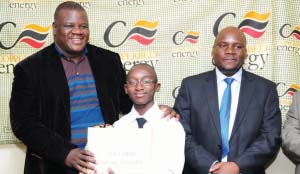
•THIRTEEN-YEAR-OLD Mulenga Chilambwe poses for a picture with Kitwe District Education Board secretary Kezala Mwale(left) and CEC managing director Owen Silwavwe.
By MAYA NTANDA –
THE recent essay writing competition on renewable energy has shown how knowledgeable pupils are on issues of energy.
The competition which was sponsored by the Copperbelt Energy Corporation (CEC), ran from October to November last year and saw thirteen- year- old Mulenga Chilambwe of St Johns’ Secondary School in Mongu, Western Province emerge winner of the first prize.
Mulenga, a Grade nine pupil walked away with a tablet, education expenses for a year, a text book voucher and K7,000.
Other prize winners included Loliwe Phiri of Ndeke Secondary School, Precious Tembo of Chibote Girls, Nchima Chipuntama of Konkola Copper Mines (KCM) Nchanga Secondary school and Chisala Chewe of Mpelembe Secondary School all on the Copperbelt Province.
Generally defined, renewable energy is energy that comes from resources which are naturally replenished on a human scale such as sunlight, wind, rain, tide waves and geothermal heat.
In his essay, Mulenga exhibited an impressive grasp of the subject matter and demonstrated good understanding of how renewable energy resources available in his community of Mongu could be harnessed to impact positively on the quality of life.
He wrote: “The Barotse plains have vast open spaces which can allow the installation of equipment to harness wind power.
The energy from these wind turbines can be used to pump water to control flood waters and in the generation of electricity. Water can be pumped to the water plant and processed for domestic use in the homes. This will be cheaper than using electric pumps in the boreholes which Mongu is using at the moment.”
Mulenga says he keeps himself informed with news from around Zambia and the world and believe that when the country begins to use renewable sustainable energy to produce goods and services for its development, the environment would be clean, safe and the country would benefit from the friendly and cheap methods of using green energy.
Green energy is useful and friendly to all living things in the environment.
The types of resources that are used in generating this type of energy include solar heat, wind power, wave power, hydro power, geothermal heat below the earth’s crust and biomass energy and add that Green energy was sustainable because it was generated from these sources which, were inexhaustible and cannot run out.
Mulenga’s wish is also that as the country uses green energy, products should be produced in ways that allow for recycling materials so that the country preserves and reserves the depleting resources which were not renewable.
“When we use green energy and recycle the depleting raw materials, Zambia shall contribute to the effort of the whole world in reducing pollution” he writes.
Mulenga says using fossil fuels to generate energy adds to the pollution of the environment, increases the cost of production of services and products hence using renewable energy, would reduce the cost of producing goods and make the selling price of goods very competitive on any market.
He says that in Mongu where he lives, he has seen a lot of opportunities for harnessing and generating green energy by using renewable resources.
Examples of what can easily be done in Mongu include the use of wind power, solar power and hydro power and that at the moment, most of the health centres and homes were using solar power to generate electric power which was used to operate vaccine fridges in rural health centres, lighting, play radios and watch television in rural homes.
Mulenga believes the prices of the components used in generating electricity from solar power were becoming cheaper, clean and never produce smoke like the generators using diesel or petrol and this, he says helps in maintaining the freshness and cleanliness of the rural air in his town.
He further writes that sustainable renewable energy was better than non renewable energy generated by burning fossil fuels.
Mulenga says the cost of using non renewable energy was higher in terms of money spent and sustenance of the environment to give safe and quality support to all living things.
He believes that the survival of the whole world depends on what the citizens choose to do today in towns where they live.
“What we do in our areas affects what happens to the rest of the whole world, only humans can do what needs to be done to preserve the world for the future generations,” he writes.
Kitwe District Education Board Secretary (DEBS) Kezela Mwale said renewable energy was a long-term investment and that it frees up school finances to be spent on teaching tools and activities.
Mr Mwale said schools were increasingly becoming large consumers of energy especially with the increased use of electricity based on technology.
He said increased access to energy resources by schools opens institutions to greater opportunities and impacts positively on the quality of education provided.
“What better way than to promote innovations initiated by children and encourage community participation to promote the use of renewable energy resources that are in abundance,” he says.
Mr Mwale said using sustainable energy such as solar also provides a valuable educational opportunity and cited panels installed on rooftops, parking structures or ground mounts, which can become part of the classroom.
CEC managing director Owen Silavwe said the essay writing competition was designed to raise awareness among young people about renewable energy.
Children or pupils will not only consume energy now but also make up significant proportion of future beneficiaries and leaders in renewable energy resources.






